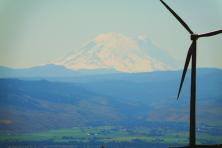Governor Inslee wants to address climate change while investing in the pressing needs of our communities, and he has proposed an efficient solution: The Carbon Pollution Accountability Act. The proposed law would hold major polluters responsible for fouling our air and water. The idea is as straightforward as it is serious: companies or institutions that generate more than 25,000 metric tons (MT) of carbon pollution per year would no longer get a free pass to exacerbate climate change with impunity.
So, who are these “major polluters” that the Governor’s plan seeks to hold culpable for the rising economic and health toll of climate change? In a recent comment, Senate Majority Leader Mark Schoesler (R-Ritzville) seems to think that institutions of high education are the problem:
“It’s Butch the Cougar the corporate polluter, and Harry the Husky…they’re named a corporate polluter. We’re going to tax our research universities to fund climate change?”
The comment lands awkwardly, to be sure, so The Seattle Times “Truth Needle” took a closer look and ruled that Sen. Schoesler’s interpretation was true, which according to the “truth needle rankings” means it “doesn’t require any additional information.” With due respect to the good intentions of The Seattle Times “Truth Needle” team, Sen. Schoesler’s comments are wildly misleading, even if factual in the strictest sense. Let’s provide the proper context.
Sen. Schoesler is correct that the University of Washington and Washington State University produce carbon pollution exceeding 25,000 metric tons per year—mostly because of the natural gas used to power and heat their campuses, which are the size of small cities. As large polluters these institutions should be held accountable for doing their fair share to reduce global warming pollution. But UW and WSU are also our most authoritative sources on climate impacts in the northwest. Both institutions are on the cutting edge of developing and commercializing clean energy technologies. It’s reasonable to expect that both institutions will be at the enthusiastic forefront of transitioning away from fossil fuels in the near future. UW and WSU should be applauded for their efforts to do their part to solve climate change.
The real focus of effective climate policy like the Carbon Pollution Accountability Act is to reduce emissions from the largest sources. Washington State has five petroleum refineries that emitted nearly six million metric tons of carbon pollution in 2010. That’s sixteen times more than UW and WSU combined. The BP refinery at Cherry Point alone spewed almost ten times more than UW’s Seattle campus. Trying to compare mega-polluters like BP to UW is like trying to compare a chain smoker to someone who has one cigarette a month and is actively trying to quit. Sen. Schoesler is hoping to shield the destructive impacts of the state’s worst polluters behind the progress made by UW and WSU–a rather cynical political move.
Governor Inslee’s plan bears little resemblance to Sen. Schoesler’s characterization. The Governor’s proposal will allow us to hold accountable those whose actions are endangering the future of our state’s prosperity and our children’s health. It will allow us to fund education and invest in working families. Sen. Schoesler gaffes about taxing research universities to “fund climate change.” But it’s oil companies who are really fueling climate change (while funding the opponents of climate action).
Yes, UW and WSU are currently using fossil fuels—but they’re also leading the charge to replace them. Sen. Schoesler’s attempt to lump our public universities in with multi-national fossil fuel corporations that claim pointless tax breaks while ducking responsibility for deadly explosions, should be called out for what it is: political fiction.




